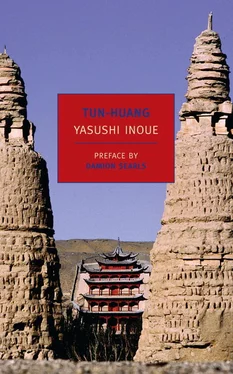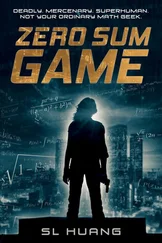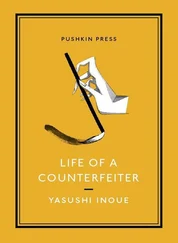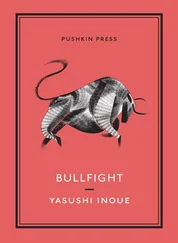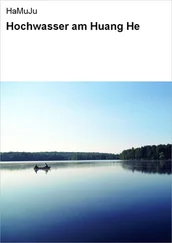He honestly believed them. And he also felt the girl’s present sorrow pulsing inside his own heart.
“Are you really going?”
“I must.”
“Will you return?”
“I’ll definitely be back within a year.”
“Then I’ll wait for you here. Promise me you’ll come back.” The girl cried bitterly again as she spoke. Resolutely, Hsing-te left for his quarters, staring all the while at his moving shadow which resembled a blot of ink spilled upon the ground, whose soil had a light, ashlike quality.
The next morning Hsing-te went to Wang-li’s quarters. Wang-li assumed that Hsing-te had come to say goodbye.
“You and I will die together at the same place. Hurry back! Someday the two of us must take part in such a fierce battle that we alone will survive. Then we shall win the battle. And don’t ever forget our promise to build the monument,” he said. It was obvious that Wang-li was still not satisfied with the violence of the recent battle.
“What I really came for was to ask a very special favor of you,” Hsing-te started. Noting from Hsing-te’s expression that it was a serious matter, Wang-li spoke gravely. “What is it? Speak up!”
“I’m hiding a young girl of the Uighur royal family. I want to ask you to give her your protection.”
“A girl!” Wang-li’s expression showed conflicting emotions. Then his eyes gleamed and he asked, “A woman? There’s a woman?”
“She’s not an ordinary woman. She’s a princess.”
“What’s so different about a princess? Hurry up and show her to me!” Wang-li stood up. Hsing-te tried a new approach.
“She is not an ordinary woman. She has Chinese blood, just like you and I. She can also speak Chinese.”
“A woman is a woman, right? There’s only one use for a woman.” Hsing-te began to regret having brought up the subject of the girl with Wang-li.
“If you touch this girl, you will die.”
“Die?” Wang-li looked surprised at this unexpected bit of information.
“Why will I die?”
“From ancient times it has been said that anyone who has intercourse with royal women of the Uighurs will not live long.”
“Do you think I’m the type who’s afraid of dying a little earlier?”
“You won’t die in battle. Your body will shrivel up and then you’ll die.”
Wang-li was silent. He half believed Hsing-te although he still had some doubts. But the thought of dying in any place other than on the battlefield was something that Wang-li could not bear.
“Well, then, I won’t meet this woman,” said Wang-li. Then changing his mind immediately, he added, “But I won’t be satisfied until I see her. Show her to me once. It wouldn’t matter if I just looked at her, would it?”
Hsing-te led Wang-li to the hut. The girl had left the cellar and was seated on the dirt floor. Wang-li stared boldly at her, but made no attempt to enter.
“You’re right, she’s no ordinary woman.” He spoke in a subdued tone.
“Is this man to look after me from today?” The girl spoke unexpectedly.
Wang-li recoiled at the sound of her voice and took a few steps backward. Then, abruptly, he turned his back on the girl and walked away. When Hsing-te caught up with him, Wang-li said, “I don’t know how to manage women like her. I don’t think I can do anything for her. If it’s enough to have some Uighur native bring her meals to her, I can agree to that.”
Then as if the thought had just occurred to him, he asked, “Why did you hide her?”
“I’m not exactly sure myself,” Hsing-te replied.
“I suppose that’s so. Even you wouldn’t know. She’s that kind of woman. Her type is beyond me. I can tell that at a glance. That kind of woman becomes very demanding and willful. I know. And no matter how unreasonable their demands, we can’t help doing as they say. I know that very well. She will be completely in control of a man. She is a woman, and yet somehow more than just a woman. Aren’t there any ordinary women around somewhere?” Sincerity rang in Wang-li’s words. There was no deceit or pretense. But Hsing-te still felt that he must have the girl looked after. So he repeated his request.
“I don’t want to see that woman again. I want nothing more to do with her. But since I’ve seen her I don’t have the heart to abandon her. I’ll have the Uighurs look after her.”
Wang-li returned to his quarters and ordered his men to bring in five elderly Uighurs. From this group he chose one and dismissed the others. He glared at him and said, “I want you to bring meals to a woman and take care of all her wants. If you tell anyone about this, or if there’s any suspicion cast on your activities, I’ll have your head on the spot. Do you understand?”
The Uighur mumbled under his breath that misfortunes rained upon him one after another. In the end he agreed to carry out the orders. Hsing-te took the old man to the girl’s shelter, and when they arrived, he again made him promise faithfully to carry out Wang-li’s orders.
After dismissing the old man, Hsing-te exchanged farewells with the girl. She made Hsing-te repeat his vow to return within a year. Then she said, “Now please leave quickly.”
As they parted, the girl took one of the two necklaces from around her neck and handed it silently to Hsing-te. Her smile was weak but infinitely tender. Hsing-te held her hand briefly, then left quickly. The iciness of the girl’s hand in his own rough one remained with Hsing-te. As he passed through the gate of the house, he encountered the old Uighur coming toward him with a full bucket of water.
“I’ll take care that no one sees me. Don’t worry.” The old man spoke reassuringly.
Hsing-te left the city at noon. At the gate he joined the ranks of about two hundred men preparing to leave. He had no idea what Wang-li had told the young commander about him, but Hsing-te felt that the commander held him in great respect.
It was June of 1028.
Hsing-te arrived in the Hsi-hsia capital of Hsing-ch’ing, after his first trip across the great expanse of desert from Liang-chou, and found the city jubilant over Hsi-hsia’s successful invasion of Kan-chou. It was difficult for Hsing-te, who had spent his time at the frontier, to understand why this victory over the Uighurs was important to the Hsi-hsia, but their success in Liang-chou, followed by their invasion of Kan-chou, meant that they had crossed their first major hurdle in gaining trading rights with the west.
Until then, rugs and jewels — indeed, all types of goods from the west — had first passed through Uighur hands, then entered China and Khitan in the east. The Uighurs alone had profited from the trade, but from now on Hsi-hsia would take over the business role of the Uighurs. The conquest of Liang-chou, which meant control of all the thoroughbred horses in the world, was primarily of military significance, but the economic gain to the newly-founded Hsi-hsia nation from its invasion of Kan-chou was incalculable. In the Wuliang territory, the only areas left to conquer were Kua-chou and Sha-chou, which were under Chinese rule. If Hsi-hsia overcame these two regions it would then border directly on Central Asia — the gateway to the countries of the west with their unlimited wealth.
As might be expected of the capital of Hsi-hsia, Hsing-ch’ing was completely different from Liang-chou and Kan-chou. Although the desert started a short distance away, Hsing-ch’ing itself was a city set in the center of a plain full of trees and greenery. In the distant west were the Ho-lan mountains, and about ten miles to the east was the Yellow River. Surrounding Hsing-ch’ing were rivers and swamps, neatly laid out irrigation ditches, and farms and orchards, which stretched away into the distance.
Читать дальше
